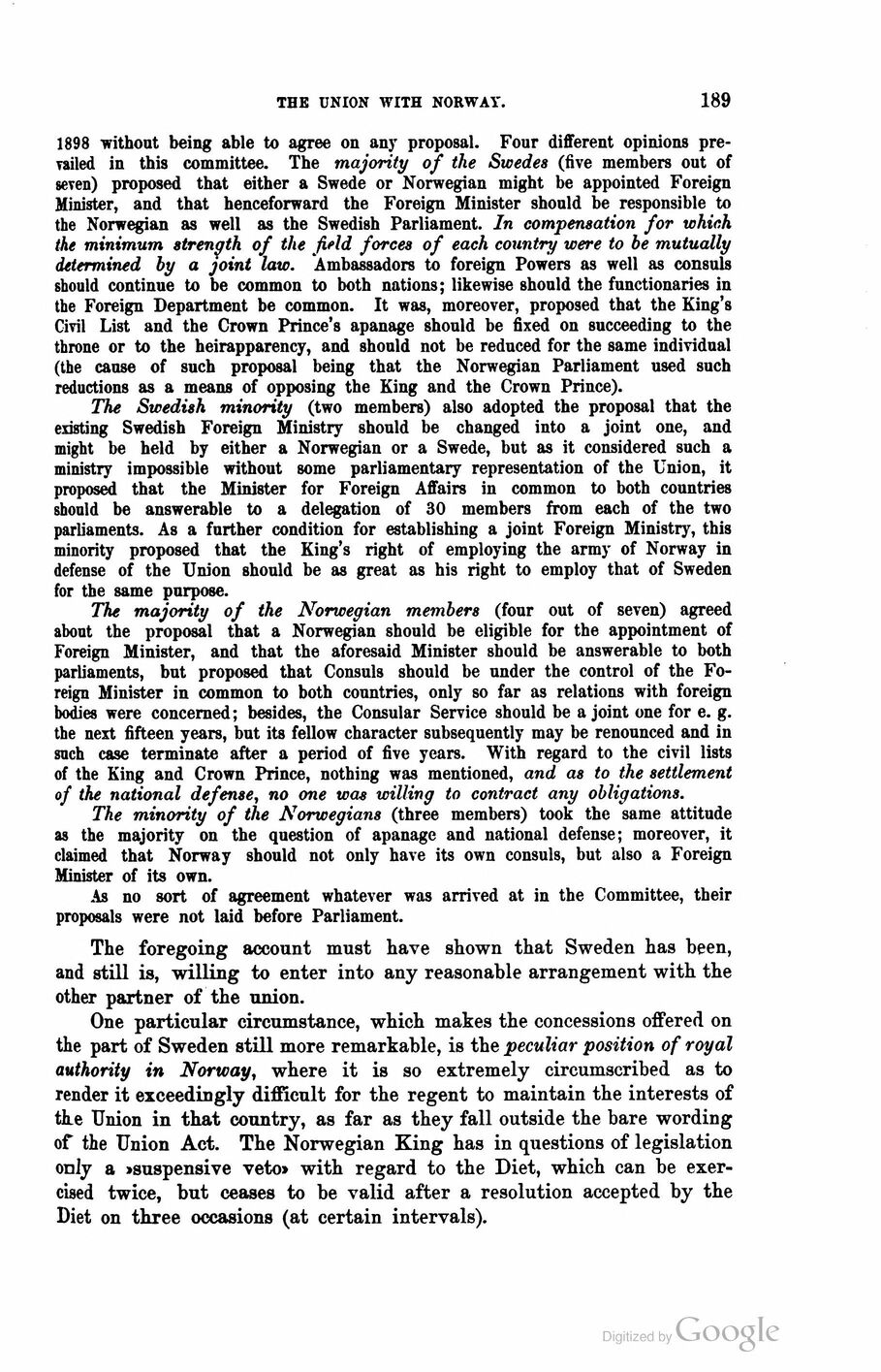
Full resolution (JPEG) - On this page / på denna sida - First part - III. Constitution and Administration - 1. Constitution - The Union with Norway, by E. Arosenius, Ph. D., Royal Central Bureau of Statistics, Stockholm

<< prev. page << föreg. sida << >> nästa sida >> next page >>
Below is the raw OCR text
from the above scanned image.
Do you see an error? Proofread the page now!
Här nedan syns maskintolkade texten från faksimilbilden ovan.
Ser du något fel? Korrekturläs sidan nu!
This page has never been proofread. / Denna sida har aldrig korrekturlästs.
THE UNION WITH NORWAY.
189
1898 without being able to agree on any proposal. Four different opinions
prevailed in this committee. The majority of the Swedes (five members out of
seven) proposed that either a Swede or Norwegian might be appointed Foreign
Minister, and that henceforward the Foreign Minister should be responsible to
the Norwegian as well as the Swedish Parliament. In compensation for which
the minimum strength of the field forces of each country were to be mutually
determined by a joint law. Ambassadors to foreign Powers as well as consuls
should continue to be common to both nations; likewise should the functionaries in
the Foreign Department be common. It was, moreover, proposed that the King’s
Civil List and the Crown Prince’s apanage should be fixed on succeeding to the
throne or to the heirapparency, and should not be reduced for the same individual
(the cause of such proposal being that the Norwegian Parliament used such
reductions as a means of opposing the King and the Crown Prince).
The Swedish minority (two members) also adopted the proposal that the
existing Swedish Foreign Ministry should be changed into a joint one, and
might be held by either a Norwegian or a Swede, but as it considered such a
ministry impossible without some parliamentary representation of the Union, it
proposed that the Minister for Foreign Affairs in common to both countries
should be answerable to a delegation of 30 members from each of the two
parliaments. As a further condition for establishing a joint Foreign Ministry, this
minority proposed that the King’s right of employing the army of Norway in
defense of the Union should be as great as his right to employ that of Sweden
for the same purpose.
The majority of the Norwegian members (four out of seven) agreed
about the proposal that a Norwegian should be eligible for the appointment of
Foreign Minister, and that the aforesaid Minister should be answerable to both
parliaments, but proposed that Consuls should be under the control of the
Foreign Minister in common to both countries, only so far as relations with foreign
bodies were concerned; besides, the Consular Service should be a joint one for e. g.
the next fifteen years, but its fellow character subsequently may be renounced and in
such case terminate after a period of five years. With regard to the civil lists
of the King and Crown Prince, nothing was mentioned, and as to the settlement
of the national defense, no one was willing to contract any obligations.
The minority of the Norwegians (three members) took the same attitude
as the majority on the question of apanage and national defense; moreover, it
claimed that Norway should not only have its own consuls, but also a Foreign
Minister of its own.
As no sort of agreement whatever was arrived at in the Committee, their
proposals were not laid before Parliament.
The foregoing account must have shown that Sweden has been,
and still is, willing to enter into any reasonable arrangement with the
other partner of the union.
One particular circumstance, which makes the concessions offered on
the part of Sweden still more remarkable, is the peculiar position of royal
authority in Norway, where it is so extremely circumscribed as to
render it exceedingly difficult for the regent to maintain the interests of
the Union in that country, as far as they fall outside the bare wording
of the Union Act. The Norwegian King has in questions of legislation
only a »suspensive veto» with regard to the Diet, which can be
exercised twice, but ceases to be valid after a resolution accepted by the
Diet on three occasions (at certain intervals).
<< prev. page << föreg. sida << >> nästa sida >> next page >>